华慧考博针对2016年社科院考博英语试题特点分析
华慧中国科学院考博英语考试内容及项目
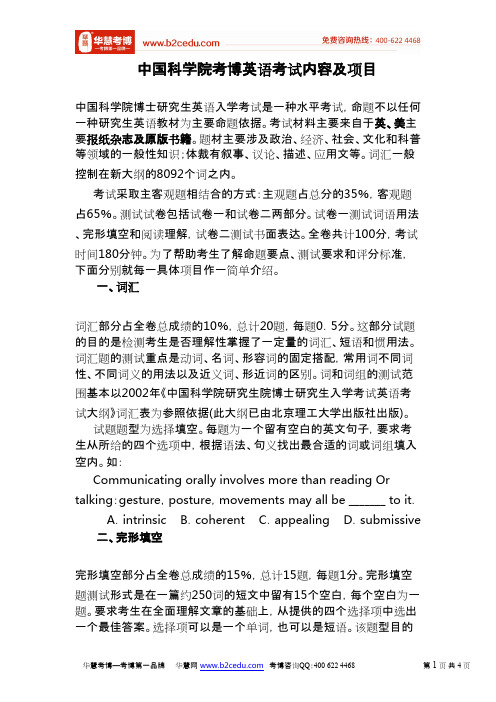
中国科学院考博英语考试内容及项目中国科学院博士研究生英语入学考试是一种水平考试,命题不以任何一种研究生英语教材为主要命题依据。
考试材料主要来自于英、美主要报纸杂志及原版书籍。
题材主要涉及政治、经济、社会、文化和科普等领域的一般性知识;体裁有叙事、议论、描述、应用文等。
词汇一般控制在新大纲的8092个词之内。
考试采取主客观题相结合的方式:主观题占总分的35%,客观题占65%。
测试试卷包括试卷一和试卷二两部分。
试卷一测试词语用法、完形填空和阅读理解,试卷二测试书面表达。
全卷共计100分,考试时间180分钟。
为了帮助考生了解命题要点、测试要求和评分标准,下面分别就每一具体项目作一简单介绍。
一、词汇词汇部分占全卷总成绩的10%,总计20题,每题0.5分。
这部分试题的目的是检测考生是否理解性掌握了一定量的词汇、短语和惯用法。
词汇题的测试重点是动词、名词、形容词的固定搭配,常用词不同词性、不同词义的用法以及近义词、形近词的区别。
词和词组的测试范围基本以2002年《中国科学院研究生院博士研究生入学考试英语考试大纲》词汇表为参照依据(此大纲已由北京理工大学出版社出版)。
试题题型为选择填空。
每题为一个留有空白的英文句子,要求考生从所给的四个选项中,根据语法、句义找出最合适的词或词组填入空内。
如:Communicating orally involves more than reading Or talking:gesture,posture,movements may all be _______ to it. A.intrinsic B.coherent C.appealing D.submissive二、完形填空完形填空部分占全卷总成绩的15%,总计15题,每题1分。
完形填空题测试形式是在一篇约250词的短文中留有15个空白,每个空白为一题。
要求考生在全面理解文章的基础上,从提供的四个选择项中选出一个最佳答案。
【华慧考博独家分享】医学考博英语统考命题特点
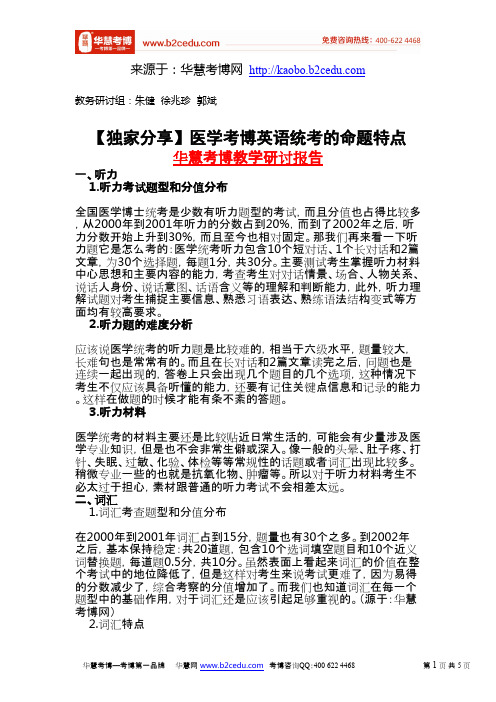
来源于:华慧考博网教务研讨组:朱健徐兆珍郭斌【独家分享】医学考博英语统考的命题特点华慧考博教学研讨报告一、听力1.听力考试题型和分值分布全国医学博士统考是少数有听力题型的考试,而且分值也占得比较多,从2000年到2001年听力的分数占到20%,而到了2002年之后,听力分数开始上升到30%,而且至今也相对固定。
那我们再来看一下听力题它是怎么考的:医学统考听力包含10个短对话、1个长对话和2篇文章,为30个选择题,每题1分,共30分。
主要测试考生掌握听力材料中心思想和主要内容的能力,考查考生对对话情景、场合、人物关系、说话人身份、说话意图、话语含义等的理解和判断能力,此外,听力理解试题对考生捕捉主要信息、熟悉习语表达、熟练语法结构变式等方面均有较高要求。
2.听力题的难度分析应该说医学统考的听力题是比较难的,相当于六级水平,题量较大,长难句也是常常有的。
而且在长对话和2篇文章读完之后,问题也是连续一起出现的,答卷上只会出现几个题目的几个选项,这种情况下考生不仅应该具备听懂的能力,还要有记住关键点信息和记录的能力。
这样在做题的时候才能有条不紊的答题。
3.听力材料医学统考的材料主要还是比较贴近日常生活的,可能会有少量涉及医学专业知识,但是也不会非常生僻或深入。
像一般的头晕、肚子疼、打针、失眠、过敏、化验、体检等等常规性的话题或者词汇出现比较多。
稍微专业一些的也就是抗氧化物、肿瘤等。
所以对于听力材料考生不必太过于担心,素材跟普通的听力考试不会相差太远。
二、词汇1.词汇考查题型和分值分布在2000年到2001年词汇占到15分,题量也有30个之多。
到2002年之后,基本保持稳定:共20道题,包含10个选词填空题目和10个近义词替换题,每道题0.5分,共10分。
虽然表面上看起来词汇的价值在整个考试中的地位降低了,但是这样对考生来说考试更难了,因为易得的分数减少了,综合考察的分值增加了。
而我们也知道词汇在每一个题型中的基础作用,对于词汇还是应该引起足够重视的。
2016年3月中国科学院考博英语真题试卷(题后含答案及解析)
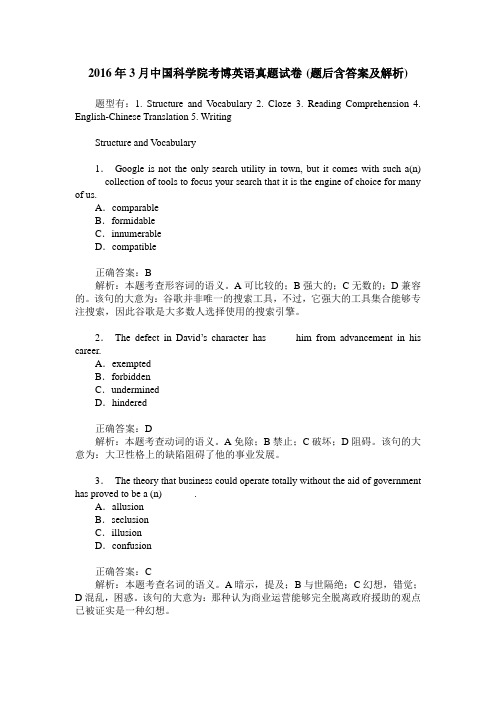
2016年3月中国科学院考博英语真题试卷(题后含答案及解析)题型有:1. Structure and V ocabulary 2. Cloze 3. Reading Comprehension 4. English-Chinese Translation 5. WritingStructure and V ocabulary1.Google is not the only search utility in town, but it comes with such a(n) ______collection of tools to focus your search that it is the engine of choice for many of us.A.comparableB.formidableC.innumerableD.compatible正确答案:B解析:本题考查形容词的语义。
A可比较的;B强大的;C无数的;D兼容的。
该句的大意为:谷歌并非唯一的搜索工具,不过,它强大的工具集合能够专注搜索,因此谷歌是大多数人选择使用的搜索引擎。
2.The defect in David’s character has______him from advancement in his career.A.exemptedB.forbiddenC.underminedD.hindered正确答案:D解析:本题考查动词的语义。
A免除;B禁止;C破坏;D阻碍。
该句的大意为:大卫性格上的缺陷阻碍了他的事业发展。
3.The theory that business could operate totally without the aid of government has proved to be a (n) ______.A.allusionB.seclusionC.illusionD.confusion正确答案:C解析:本题考查名词的语义。
华慧复旦大学考博英语写作题型分析-华慧考博英语写作学习方法

复旦大学考博英语翻译题型分析翻译学习方法复旦大学考博英语写作(1题,共计15分 1×15=15)写作是考博英语的重点,考察考生用英语分析事物和表达自己的观点的能力或概括事物的能力。
这部分对大叔考生来说是最难攻克的难关。
复旦大学考博英语的写作占15分,要求考生看图作文写一篇25 0字左右的评论。
写作题的目的是测试考生用英语表达思想或传递信息的能力及对英文写作基础知识的实际运用。
从复旦考博写作题型上来看,07年以前主要是命题作文,08年以后主要是图表作文,即要求考生在所给时间内,对所给图表进行分析归纳和总结,然后用简洁、生动、准确的语言将图中所提供的信息完整地表达出来,并对图中的信息作出自己的评论复旦考博英语试卷中短文写作部分改变了以往提纲三段式作文形式,采用了图画式作文。
此举的目的是为了避免考生猜题,同时也增加了作文的难度。
考生除了在语言技能上多下功夫外,还要熟悉一些图表式作文的要领。
从复旦考博写作的选材上来说,主要是针对一些学习、工作、生活上的问题的思考以及对社会现象的评论,提出自己的观点并论述。
例如2009年的公交车上不给老年人让座,2008年的针对考试成绩的不同态度,2006年的态度决定结果等,或者按照命题写出一篇200字的命题作文,例如2007年的野心塑造男人,2005年的对当代中国的传统节日的看法。
for their free time. Which doyou prefer?2003年The Values of Failure既定主题,观点论述2004年One of turning Points in MyLife叙事类2005年My Opinion aboutTraditional Holidays in China 既定主题,观点论述2006年Attitude is Everything结合图片,观点类2007年My Views about “Ambition Makes a Man”既定主题,观点论述2008年Optimism or Pressimism结合图片,观点类2009年Persuasion结合图片,观点类2010年Privacy and Liberty既定主题,观点论述2011年plagiarism 既定主题,观点论述复旦大学考博英语写作重点:怎样写好主题句段落的主题一篇文章有中心思想,也就是题目。
华慧中国科学院考博英语阅读题型概述及考情分析

中国科学院考博英语阅读题型概述及考情分析 中国科学院考博英语阅读理解短文内容涉及社会科学(主要包括社会学、教育、人类学、心理学、经济、管理、金融等领域)、自然科学(主要包括化学、生物、交通、物理、工程、计算机、医学、农业等领域)和人文科学(主要包括哲学、历史、文学、语言、新闻、艺术等领域)。
根据大纲要求,阅读理解的常考题型主要可归纳为以下几种:主旨大意题、推理判断题、词汇语义型、事实细节题及观点态度题。
中国科学院考博英语的阅读理解共分两部分。
中国科学院考博英语阅读第一部分:5篇短文,每篇短文有6道题目,共30道题目,每道题1分,共占30分。
考生需完成1800-2200词汇的阅读量。
这一部分主要测试考生在规定60分钟时间内通过阅读获取相关信息的能力。
要求考生能够: 1.掌握中心思想、主要内容和具体细节; 2.进行相关的分析、判断和推理; 3.准确把握某些词和词组在上下文中的特定含义; 4.领会作者的观点和意图、判断作者的态度。
从近几年中国科学院考博英语阅读文章选材来看,文章涉及话题广泛,人文,医学,环境等话题出现比较多。
从中国科学院考博英语阅读理解整体来看,最常考是以下几种题型:细节题、词汇理解题和态度题。
要求考生从整体上要把握好出题的规律,但在具体的细节上要把握命题人的考试意图,将考点击破,双管齐下,实现考分的飞跃。
下面介绍中国科学院考博英语阅读理解问题的几种主要出题手段、解题技巧和实例分析。
A、细节题 1.标志:针对性提问2.思路:做题的关键是返回原文,不要凭印象做题,返回原文要有定位意识3.细节题迷惑选项的常用手段有:偷换概念、扩大范围、正反混淆、颠倒因果、常识判断(列举和文章无关的常识,尽管常识是对的,但文章中未提,这也是错误答案) 例如:2010. Question45. The Japanese Matinee Girl would most likely favor a play that centers on .A. the childhood of a naughty boyB. the honeymoon of a young coupleC. the trial of a serial murdererD. the misfortunes of a big family B、主旨题 1.标志:the most appropriate/best title,main idea,main problem,conclusion,purpose,primarily concerned with,stress the idea2.思路:利用宏观阅读思路解题,不管此类题出现在哪个位置,都作为最后一题解答。
华慧中国科学院考博英语翻译题型概述及考情分析
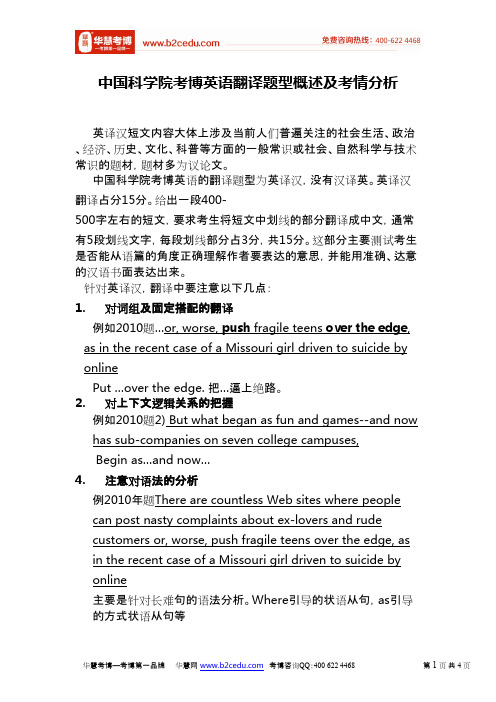
中国科学院考博英语翻译题型概述及考情分析英译汉短文内容大体上涉及当前人们普遍关注的社会生活、政治、经济、历史、文化、科普等方面的一般常识或社会、自然科学与技术常识的题材,题材多为议论文。
中国科学院考博英语的翻译题型为英译汉,没有汉译英。
英译汉翻译占分15分。
给出一段400-500字左右的短文,要求考生将短文中划线的部分翻译成中文,通常有5段划线文字,每段划线部分占3分,共15分。
这部分主要测试考生是否能从语篇的角度正确理解作者要表达的意思,并能用准确、达意的汉语书面表达出来。
针对英译汉,翻译中要注意以下几点:1.对词组及固定搭配的翻译例如2010题…or, worse, push fragile teens over the edge, as in the recent case of a Missouri girl driven to suicide by onlinePut …over the edge. 把…逼上绝路。
2.对上下文逻辑关系的把握例如2010题2) But what began as fun and games--and now has sub-companies on seven college campuses,Begin as…and now…4.注意对语法的分析例2010年题There are countless Web sites where people can post nasty complaints about ex-lovers and rude customers or, worse, push fragile teens over the edge, as in the recent case of a Missouri girl driven to suicide by online主要是针对长难句的语法分析。
Where引导的状语从句,as引导的方式状语从句等5.注意指代与省略句的翻译例如2009年题 is a rapidly growing gossip site that solicits content with the promise of anonymity. But what began as fun and gamesWhat 是 的指代和省略。
华慧考博英语作文预测
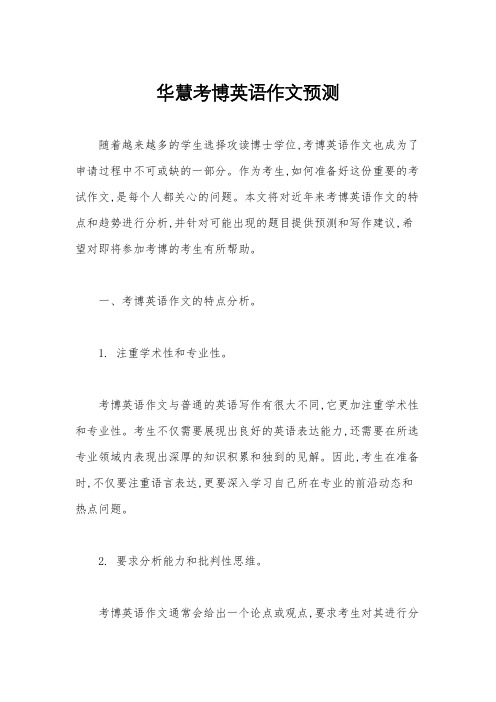
华慧考博英语作文预测随着越来越多的学生选择攻读博士学位,考博英语作文也成为了申请过程中不可或缺的一部分。
作为考生,如何准备好这份重要的考试作文,是每个人都关心的问题。
本文将对近年来考博英语作文的特点和趋势进行分析,并针对可能出现的题目提供预测和写作建议,希望对即将参加考博的考生有所帮助。
一、考博英语作文的特点分析。
1. 注重学术性和专业性。
考博英语作文与普通的英语写作有很大不同,它更加注重学术性和专业性。
考生不仅需要展现出良好的英语表达能力,还需要在所选专业领域内表现出深厚的知识积累和独到的见解。
因此,考生在准备时,不仅要注重语言表达,更要深入学习自己所在专业的前沿动态和热点问题。
2. 要求分析能力和批判性思维。
考博英语作文通常会给出一个论点或观点,要求考生对其进行分析、评论和论证。
这就需要考生具备较强的分析能力和批判性思维。
考生不仅要能准确理解题目要求,还要能够客观评估论点的合理性,并提出自己的观点并加以论证。
3. 重视学术规范和写作格式。
考博英语作文不同于日常生活中的写作,它更加注重学术规范和写作格式。
考生在写作时,需要严格遵守学术论文的格式要求,包括引用格式、段落结构、逻辑性等。
同时,考生还要注意语言的正式性和学术性,避免使用口语化或者生活化的表达。
4. 要求独立思考和创新。
考博英语作文不是简单的背诵和复制,而是需要考生独立思考和创新。
考生不仅要展现出自己的专业知识,还要能够提出新颖的观点和见解,体现出自己的创新能力。
这就要求考生在平时的学习和研究中,要保持开放和探索的态度,不断吸收新知识,培养独立思考的能力。
二、近年考博英语作文题目预测。
根据往年考博英语作文的题目分布情况,我们可以对未来可能出现的题目进行一些预测。
需要注意的是,这只是一种预测,具体题目还需要根据当年的考试大纲和考试范围而定。
1. 学术研究方向和前沿问题。
考博英语作文可能会围绕学术研究方向和前沿问题展开。
例如,可能会要求考生就某一领域的热点问题进行分析和论述,或者就学科发展的新动向提出自己的看法和建议。
华慧上海交通大学考博英语阅读理解题型介绍

上交大考博英语阅读理解题型介绍及专项训练阅读理解的短文内容涉及社会科学(主要包括社会学、教育、人类学、心理学、经济、管理、金融等领域)、自然科学(主要包括化学、生物、交通、物理、工程、计算机、医学、农业等领域)和人文科学(主要包括哲学、历史、文学、语言、新闻、艺术等领域)。
考博英语的阅读理解题型中的文章通常选取外文杂志、外文网站中的文章,然后由各院校的命题组命题,或者选取四六级、考研、研究生学位英语考试等已考过的文章。
纵观各院校的考博英语阅读理解题型,主要涉及了四种考查方式:1)常规阅读理解题给出一篇文章,文章后面会有几个问题或者未完成的陈述,而且每个问题都会有四个选项,要求考生选择符合题意的最佳答案。
根据大纲要求,常规阅读理解主要考查主旨大意题、推理判断题、词义猜测型、事实细节题及观点态度题。
2)阅读解答题给出一篇文章,要求考生回答题后的5个问题。
主要考查考生对文章的中心思想、重要细节的理解和提取,并用较为精炼的语言将其陈述清楚。
3)阅读选句填空题给出一篇文章,将其中一些信息除去,而且文章后面会有多于空格数量的句子或者段落,要求考生在理解中心大意的基础上,联系上下文的内容,选择合适的句子填入空白处。
4)阅读排序题给出一篇文章,分别去除部分信息,文章后会有相应的选项,要求考生通过对文章连贯性、一致性的理解,将这些选项正确的排列,这部分对阅读理解的综合能力要求比较高。
当然,有的院校会考快速阅读,难度低于常规(仔细)阅读理解题。
有的院校出阅读判断题,即通过阅读文章,判断文章后所给出的陈述是否正确。
阅读理解题型中,常规阅读理解是必考的,其他题型是根据各院校的具体情况变动。
总之,阅读理解题型是考博英语题型中占分比例最大的,考生应该予以更多的重视,找准复习方向,多熟练阅读理解中各类题型的解题技巧。
【华慧考博独家解析】-详细解析请购买《华慧中科院考博英语一本通》-联系QQ:4006224468上海交通大学考博英语备考专题2016年上海交通大学考博英语VIP保过班-全程1对1辅导考上交大更轻松!2016年上海交通大学考博英语协议全程班-5次1对1辅导考上交大更轻松!2016年上海交通大学考博英语系统全程班-考上交大更轻松!华慧上海交通大学上交大考博英语一本通含独家历年试题答案解析上海交通大学/上交大考博英语历年真题汇总考博咨询QQ:4006224468考博资料分享QQ群:16731818关注华慧考博微信编辑推荐:考博英语辅导班:/classroom?t=1113.0考博英语专题/kaoboyingyu.html考博英语怎么复习?/yingyu_fuxi.html 考博英语真题汇总专题/kaobo_zhenti. html2016医学考博专题/yixue_kaobo.html。
华慧中科院考博英语写作题型考情分析

中科院考博英语翻译题型考情分析中国科学院考博英语的写作一般是考博试卷的最后一个部分,占20分,要求考生按照命题写出一篇200字的短文,目的是测试考生用英语表达思想或传递信息的能力及对英文写作基础知识的实际运用。
写作应注重思想性,能有深刻的观点为佳。
阅卷老师批改一篇文章的速度为10秒左右,所以字迹工整极为重要。
华慧考博教研中心就中国科学院考博写作题型上来看,主要是命题作文,为单一观点(A+/A-)或对立观点(A orB)。
从中国科学院考博写作的选材上来说,主要是针对一些学习、工作、生活上的问题的思考以及对社会现象的评论,提出自己的观点并论述。
中国科学院考博英语历年写作主题包括:2010.10北京是否应该控制人口2010.3人们为什么在同样的情况下会做出不同的决定2009.3中国高中应该分文理科吗2008.10中国举办奥运会有什么收获2008.3你认为什么时候确定专业比较好,是上大学前还是被大学录取时2007.10你认为学生侮辱老师的原因是什么2007.3你如何面对找工作时的外表歧视2006.10你对明星崇拜者的态度是什么2006.3中国没有诺贝尔奖获得者的原因是什么2005.10工作对你的意义是什么?中国科学院考博英语备考专题2016年中国科学院考博英语VIP保过班-全程1对1辅导考中科院更轻松!2016年中国科学院考博英语协议全程班-5次1对1辅导考中科院更轻松!2016年中国科学院考博英语系统全程班-考中科院更轻松!华慧中国科学院中科院考博英语一本通含独家历年试题答案解析中国科学院/中科院考博英语历年真题汇总华慧考博网-考博第一品牌()考博咨询QQ:4006224468编辑推荐:考博英语辅导班:/classroom?t=1113.0考博英语专题/kaoboyingyu.html考博英语怎么复习?/yingyu_fuxi.html 考博英语真题汇总专题/kaobo_zhenti. html2016医学考博专题/yixue_kaobo.html。
华慧清华大学考博英语完形填空题型概述及考情分析
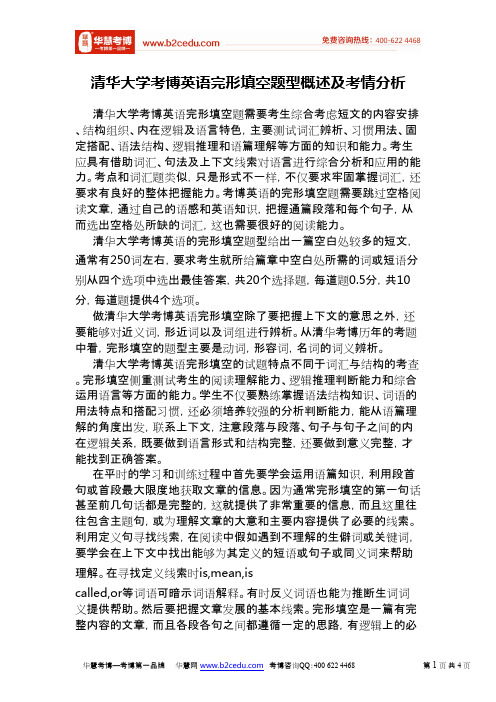
清华大学考博英语完形填空题型概述及考情分析清华大学考博英语完形填空题需要考生综合考虑短文的内容安排、结构组织、内在逻辑及语言特色,主要测试词汇辨析、习惯用法、固定搭配、语法结构、逻辑推理和语篇理解等方面的知识和能力。
考生应具有借助词汇、句法及上下文线索对语言进行综合分析和应用的能力。
考点和词汇题类似,只是形式不一样,不仅要求牢固掌握词汇,还要求有良好的整体把握能力。
考博英语的完形填空题需要跳过空格阅读文章,通过自己的语感和英语知识,把握通篇段落和每个句子,从而选出空格处所缺的词汇,这也需要很好的阅读能力。
清华大学考博英语的完形填空题型给出一篇空白处较多的短文,通常有250词左右,要求考生就所给篇章中空白处所需的词或短语分别从四个选项中选出最佳答案,共20个选择题,每道题0.5分,共10分,每道题提供4个选项。
做清华大学考博英语完形填空除了要把握上下文的意思之外,还要能够对近义词,形近词以及词组进行辨析。
从清华考博历年的考题中看,完形填空的题型主要是动词,形容词,名词的词义辨析。
清华大学考博英语完形填空的试题特点不同于词汇与结构的考查。
完形填空侧重测试考生的阅读理解能力、逻辑推理判断能力和综合运用语言等方面的能力。
学生不仅要熟练掌握语法结构知识、词语的用法特点和搭配习惯,还必须培养较强的分析判断能力,能从语篇理解的角度出发,联系上下文,注意段落与段落、句子与句子之间的内在逻辑关系,既要做到语言形式和结构完整,还要做到意义完整,才能找到正确答案。
在平时的学习和训练过程中首先要学会运用语篇知识,利用段首句或首段最大限度地获取文章的信息。
因为通常完形填空的第一句话甚至前几句话都是完整的,这就提供了非常重要的信息,而且这里往往包含主题句,或为理解文章的大意和主要内容提供了必要的线索。
利用定义句寻找线索,在阅读中假如遇到不理解的生僻词或关键词,要学会在上下文中找出能够为其定义的短语或句子或同义词来帮助理解。
华慧四川大学考博英语翻译题型分析及专项训练
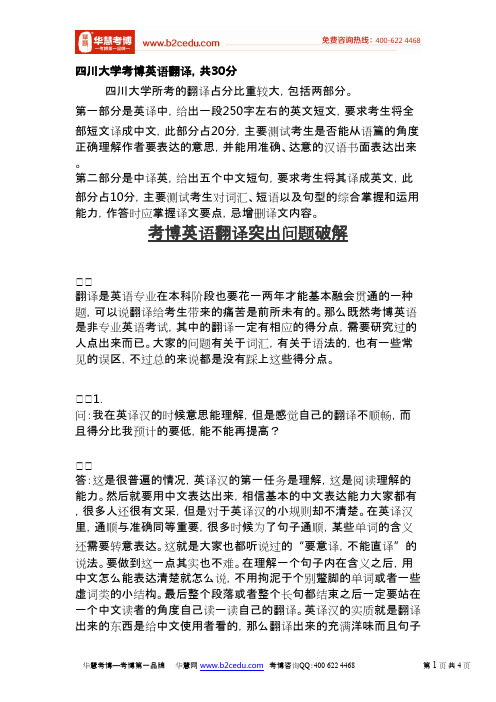
四川大学考博英语翻译,共30分四川大学所考的翻译占分比重较大,包括两部分。
第一部分是英译中,给出一段250字左右的英文短文,要求考生将全部短文译成中文,此部分占20分,主要测试考生是否能从语篇的角度正确理解作者要表达的意思,并能用准确、达意的汉语书面表达出来。
第二部分是中译英,给出五个中文短句,要求考生将其译成英文,此部分占10分,主要测试考生对词汇、短语以及句型的综合掌握和运用能力,作答时应掌握译文要点,忌增删译文内容。
翻译是英语专业在本科阶段也要花一两年才能基本融会贯通的一种题,可以说翻译给考生带来的痛苦是前所未有的。
那么既然考博英语是非专业英语考试,其中的翻译一定有相应的得分点,需要研究过的人点出来而已。
大家的问题有关于词汇,有关于语法的,也有一些常见的误区,不过总的来说都是没有踩上这些得分点。
1.问:我在英译汉的时候意思能理解,但是感觉自己的翻译不顺畅,而且得分比我预计的要低,能不能再提高?答:这是很普遍的情况,英译汉的第一任务是理解,这是阅读理解的能力。
然后就要用中文表达出来,相信基本的中文表达能力大家都有,很多人还很有文采,但是对于英译汉的小规则却不清楚。
在英译汉里,通顺与准确同等重要,很多时候为了句子通顺,某些单词的含义还需要转意表达。
这就是大家也都听说过的“要意译,不能直译”的说法。
要做到这一点其实也不难。
在理解一个句子内在含义之后,用中文怎么能表达清楚就怎么说,不用拘泥于个别蹩脚的单词或者一些虚词类的小结构。
最后整个段落或者整个长句都结束之后一定要站在一个中文读者的角度自己读一读自己的翻译。
英译汉的实质就是翻译出来的东西是给中文使用者看的,那么翻译出来的充满洋味而且句子很不通顺,这样的分数无疑是最低的。
很多人拘泥于句型和语法结构,这些都是最细枝末节的。
英语的句子用复合句,先行词,形式主语,形式宾语,这些中文都没有,但是中文自己的语言规矩大家都清楚。
另外正式一点的文体中,活用四字词无疑是润色添彩的最佳选择。
社科院博士生初试考试英语试题及答案
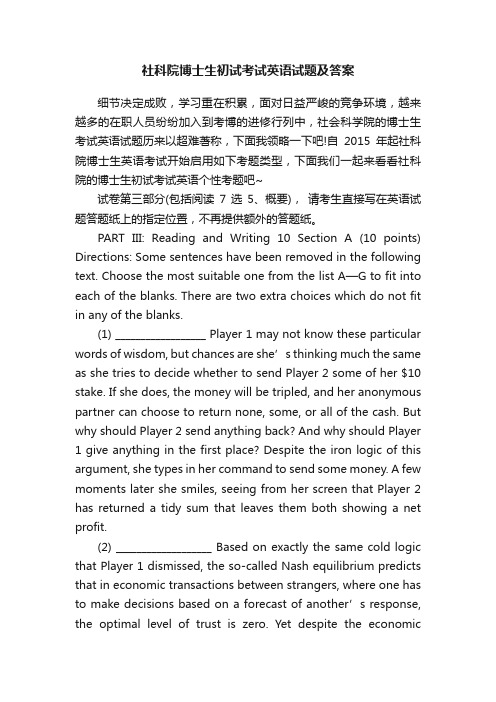
社科院博士生初试考试英语试题及答案细节决定成败,学习重在积累,面对日益严峻的竞争环境,越来越多的在职人员纷纷加入到考博的进修行列中,社会科学院的博士生考试英语试题历来以超难著称,下面我领略一下吧!自2015年起社科院博士生英语考试开始启用如下考题类型,下面我们一起来看看社科院的博士生初试考试英语个性考题吧~试卷第三部分(包括阅读7 选5、概要),请考生直接写在英语试题答题纸上的指定位置,不再提供额外的答题纸。
PART III: Reading and Writing 10 Section A (10 points) Directions: Some sentences have been removed in the following text. Choose the most suitable one from the list A—G to fit into each of the blanks. There are two extra choices which do not fit in any of the blanks.(1) __________________ Player 1 may not know these particular words of wisdom, but chances are she’s thinking much the same as she tries to decide whether to send Player 2 some of her $10 stake. If she does, the money will be tripled, and her anonymous partner can choose to return none, some, or all of the cash. But why should Player 2 send anything back? And why should Player 1 give anything in the first place? Despite the iron logic of this argument, she types in her command to send some money. A few moments later she smiles, seeing from her screen that Player 2 has returned a tidy sum that leaves them both showing a net profit.(2) ___________________ Based on exactly the same cold logic that Player 1 dismissed, the so-called Nash equilibrium predicts that in economic transactions between strangers, where one has to make decisions based on a forecast of another’s response, the optimal level of trust is zero. Yet despite the economicorthodoxy, the behavior of Players 1 and 2 is not exceptional. In fact, over the course of hundreds of such trials, it turns out that about half of Player 1s send some money, and three- quarters of Player 2s who receive it send some back.Zak is a leading protagonist in the relatively new field of neuroeconomics, which aims to understand human social interactions through every level from synapse to society. It is a hugely ambitious undertaking. By laying bare the mysteries of such nebulous human attributes as trust, neuroeconomists hope to transform our self- understanding. (3) _________________ “ As we learn more about the remarkable internal order of the mind, we will also understand far more deeply the social mind and therefore the external order of personal exchange, and the extend ed order of exchange through markets.”(4) __________________ As Zak’s collaborator Steve Knack of the World Bank points out: “Trust is one of the most powerful factors affecting a country’s economic health. Where trust is low, individuals and organizations are more wary about engaging in financial transactions, which tends to depress the national economy.”And trust levels differ greatly between nations. The World Values Survey, based at the University of Michigan, Ann Arbor, has asked people in countries around the world, “Do you think strangers can generally be trusted?” the positive response rate varies from about 65% in Norway to about 5% in Brazil. (5) __________________ “Policy-makers in these latter countries might be urgently interested in mechanisms that enable them to raise national trust levels,” observes Knack.A. Even more intriguingly, it seems that this urge to respond positively when someone shows trust in us is largely outside ourcontrol.B. Crucially for international economic development, what is true for individuals turns out also to be true for nations.C. Disturbingly, countries where trust is lower than a critical level of about 30%—as is the case in much of South America and Africa – risk falling into a permanent suspicion- locked poverty trap.D. “It’s good to trust; it’s better not to,” goes an Italian proverb.E. They believe their findings even have the potential to help make societies more productive 11 and successful.F. He points out that our brains have been tailored by evolution to cope with group living.G. This outcome doesn’t just flout proverbial wisdom, it thumbs its nose at economic theory.Section B (10 points) Directions: Write a 100—120-word summary of the article in this part.。
华中科技大学考博英语历年试题题型题量综合分析
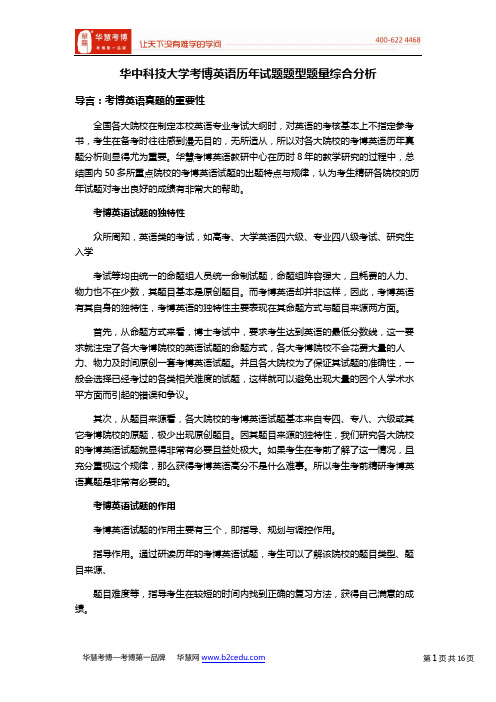
华中科技大学考博英语历年试题题型题量综合分析导言:考博英语真题的重要性全国各大院校在制定本校英语专业考试大纲时,对英语的考核基本上不指定参考书,考生在备考时往往感到漫无目的,无所适从,所以对各大院校的考博英语历年真题分析则显得尤为重要。
华慧考博英语教研中心在历时8年的教学研究的过程中,总结国内50多所重点院校的考博英语试题的出题特点与规律,认为考生精研各院校的历年试题对考出良好的成绩有非常大的帮助。
考博英语试题的独特性众所周知,英语类的考试,如高考、大学英语四六级、专业四八级考试、研究生入学考试等均由统一的命题组人员统一命制试题,命题组阵容强大,且耗费的人力、物力也不在少数,其题目基本是原创题目。
而考博英语却并非这样,因此,考博英语有其自身的独特性,考博英语的独特性主要表现在其命题方式与题目来源两方面。
首先,从命题方式来看,博士考试中,要求考生达到英语的最低分数线,这一要求就注定了各大考博院校的英语试题的命题方式,各大考博院校不会花费大量的人力、物力及时间原创一套考博英语试题。
并且各大院校为了保证其试题的准确性,一般会选择已经考过的各类相关难度的试题,这样就可以避免出现大量的因个人学术水平方面而引起的错误和争议。
其次,从题目来源看,各大院校的考博英语试题基本来自专四、专八、六级或其它考博院校的原题,极少出现原创题目。
因其题目来源的独特性,我们研究各大院校的考博英语试题就显得非常有必要且益处极大。
如果考生在考前了解了这一情况,且充分重视这个规律,那么获得考博英语高分不是什么难事。
所以考生考前精研考博英语真题是非常有必要的。
考博英语试题的作用考博英语试题的作用主要有三个,即指导、规划与调控作用。
指导作用。
通过研读历年的考博英语试题,考生可以了解该院校的题目类型、题目来源、题目难度等,指导考生在较短的时间内找到正确的复习方法,获得自己满意的成绩。
规划作用。
考生在宏观把握所报考院校的英语试题的出题规律后,结合自身的英语情况,对自己的英语备考做出一个正确且切合实际的复习规划。
华慧四川大学考博英语阅读理解题型分析及专项训练
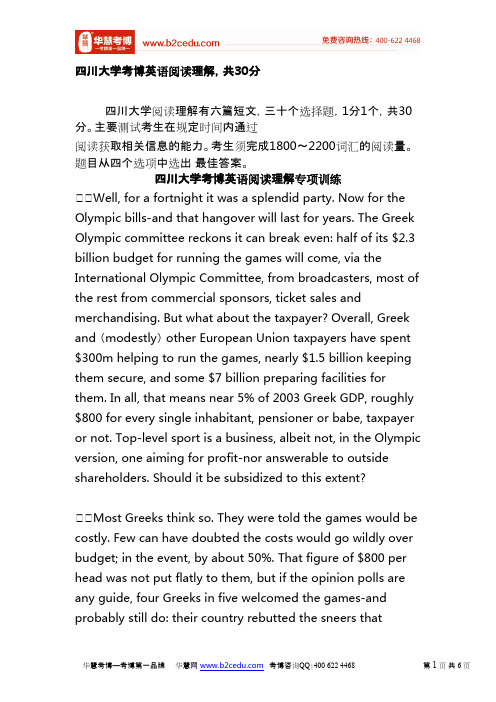
四川大学考博英语阅读理解,共30分四川大学阅读理解有六篇短文,三十个选择题,1分1个,共30分。
主要测试考生在规定时间内通过阅读获取相关信息的能力。
考生须完成1800~2200词汇的阅读量。
题目从四个选项中选出最佳答案。
四川大学考博英语阅读理解专项训练 Well, for a fortnight it was a splendid party. Now for the Olympic bills-and that hangover will last for years. The Greek Olympic committee reckons it can break even: half of its $2.3 billion budget for running the games will come, via the International Olympic Committee, from broadcasters, most of the rest from commercial sponsors, ticket sales and merchandising. But what about the taxpayer? Overall, Greek and (modestly) other European Union taxpayers have spent $300m helping to run the games, nearly $1.5 billion keeping them secure, and some $7 billion preparing facilities for them. In all, that means near 5% of 2003 Greek GDP, roughly $800 for every single inhabitant, pensioner or babe, taxpayer or not. Top-level sport is a business, albeit not, in the Olympic version, one aiming for profit-nor answerable to outside shareholders. Should it be subsidized to this extent? Most Greeks think so. They were told the games would be costly. Few can have doubted the costs would go wildly over budget; in the event, by about 50%. That figure of $800 per head was not put flatly to them, but if the opinion polls are any guide, four Greeks in five welcomed the games-and probably still do: their country rebutted the sneers thatnothing would be ready, it ran the show well, it has had a terrific time and weeks of exposure to the world's cameras, and it is left with some durable improvements to its infrastructure. Anyway, these Greeks can say, an elected government, backed by public opinion, is entitled to do what it likes: others send men into space, we run the Olympics-as we should have been allowed to do in 1996, centenary of their first modern celebration. That is true. But democratic governments can do damn-fool things; sending men into space, for example. Was the Greeks' spending wise? Prestige, publicity and proud memories are not to be ignored. But what else is left? A magnificent stadium and its accompanying public park in Athens, plus various other venues in the city or nearby; four big provincial stadiums; some cheap housing in the capital; better roads there, a bigger and better metro system, a new suburban rail line and a new tramway to the southern beaches. As one Athenian version puts it, 20 years' infrastructure improvements in five. Actually, that is not what they got. Less than $1.5 billion of the money spent has gone into the EU-subsidised transport improvements, sensible as they may be. Two weeks of security apart, most of the rest has gone into the new sports facilities. Some of these will be useful in the future, some less so. It is a fair bet that all will lose money, unless Greece can somehow achieve that rich and sports-mad Australia, with its inheritance from the Sydney games of 2000, has not. Thatseems unlikely. Granted, sports facilities can be a public good, and one that most voters approve of. But are world-class sports facilities really the public good on which the hugely indebted government of a small and not very rich country such as Greece should rush to spend over $5.5 billion? What about schools and hospitals, or the roads and other bits of infrastructure that might generate business investment, and so produce genuine economic growth, rather than mere prestige? In this context, the Greek government's claim that “oh, we'll cut spending in other ways” is hardly persuasive or even to the point. If public spending ought to be or can readily be cut, cut it anyway. If you need better public infrastructure, invest in what you need, not in what suits the International Olympic Committee. 31.The majority of Greeks, according to the text, are supportive_____. [A] preparing a splendid of horticultural party [B] abiding by the Olympic chapter [C] manufacturing commercial facilities for world expo [D] overfunding the 2003 Olympic Games 32.It is implied in the second paragraph that Greeks stilldoubt_____. [A] the comment made IOC members [B] centenary of their first national anniversary [C] the hosting right of 1996 Olympic Games [D] the 2003 failure of the International Olympic Committee 33.“Sending men into space” is quoted to_____. [A] exemplify absurd conducts [B] prove the strength of an average nation [C] report the rapid development of aeronautical science [D] survey the current exploitation of the extraterritorial conditions 34.The author's attitude toward the official assertionis_____. [A] approval [B] ambivalence [C] denial [D] confusion 35.Which of the following could be the best title of text? [A] Great sport, great feat. [B] Greek Sport Events. [C] Pity about the misspent billions. [D] Money can make the mare go. 参考答案:31. D 32. C 33. A 34. C 35. C四川大学考博英语备考专题2016年四川大学考博英语VIP保过班-全程1对1辅导考川大更轻松!2016年四川大学考博英语协议全程班-5次1对1辅导考川大更轻松!2016年四川大学考博英语系统全程班-考川大更轻松!华慧四川大学川大考博英语一本通含独家历年试题答案解析四川大学/川大考博英语历年真题汇总四川大学考博英语复习资料:《四川大学考博英语一本通》-华慧考博网《四川大学考博英语历年试题及参考答案解析》-华慧书城《华慧考博英语10000词汇详解》-天猫商城:华慧旗舰店《华慧考博英语阅读220篇》-天猫商城:华慧旗舰店《华慧考博英语完形专项训练》-华慧书城《华慧考博英语写作专项训练》-华慧书城《华慧考博英语翻译专项训练》-华慧书城华慧考博网四川大学考博英语辅导班:四川大学考博英语VIP保过班-全程1对1辅导四川大学考博英语系统全程班-赠《华慧考博英语一本通》四川大学考博英语协议全程班-5次1对1辅导四川大学考博英语真题班-近三年四川大学考博英语真题详解。
华慧复旦大学考博英语完形填空题型分析-华慧考博英语完形学习方法

remark和comment的区别 remark和comment在意思上比较相近,可以算是近义词,而且都
可以作名词和动词。 作名词时,remark指(表达某一观点)的“言论,评述”,为可数名
华慧考博—考博第一品牌 华慧网 考博咨询QQ:400 622 4468
第2页共3页
华慧考博网复旦大学考博英语辅导班: 复旦大学考博英语VIP保过班-全程1对1辅导 复旦大学考博英语系统全程班-赠《华慧考博英语一本通》 复旦大学考博英语协议全程班-5次1对1辅导 复旦大学考博英语真题班-近三年复旦大学考博英语真题详解
考博当中,在英语知识运用(完型填空)当中,经常会考到一些词 汇辨析。由于这些词汇在意思或拼写上比较相似,通常会误导考生, 比如:
华慧考博—考博第一品牌 华慧网 考博咨询QQ:400 622 4468
第1页共3页
relative作形容词时和relevant的区别 relative通常意为“相对的,相比较而言的”;表示相关时,也指的
词;而comment是(对某事物进行的)“评论,解释”(既可数也不可数),还 可以作“批评,指责”(常用单数形式)。
作动词时,两者意思差不多。但笔者认为,remark更常翻译为“ 指出,认为”;comment更正式,更侧重“评论”,而且考博中经常用到。
复旦大学考博英语复习资料: 《复旦大学考博英语一本通》-华慧考博网 《复旦大学考博英语历年试题及参考答案解析》-华慧书城 《华慧考博英语10000词汇详解》-天猫商城:华慧旗舰店 《华慧考博英语阅读220篇》-天猫商城:华慧旗舰店 《华慧考博英语完形专项训练》-华慧书城 《华慧考博英语写作专项训练》-华慧书城 《华慧考博英语翻译专项训练》-华慧书城
华慧武汉大学考博英语指导及大纲要求
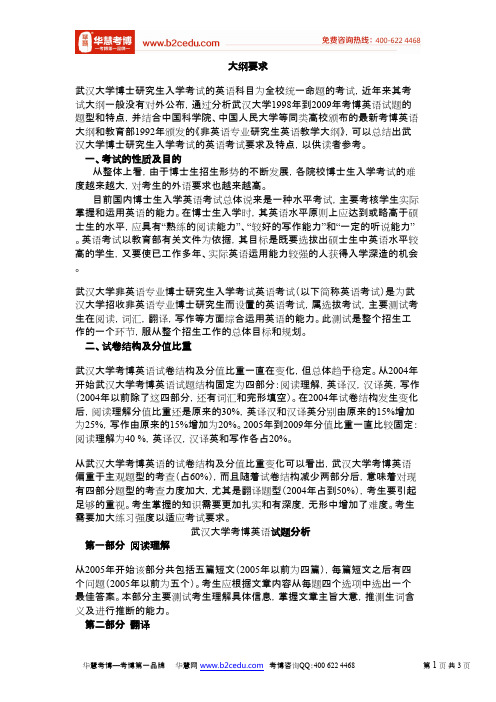
大纲要求武汉大学博士研究生入学考试的英语科目为全校统一命题的考试,近年来其考试大纲一般没有对外公布,通过分析武汉大学1998年到2009年考博英语试题的题型和特点,并结合中国科学院、中国人民大学等同类高校颁布的最新考博英语大纲和教育部1992年颁发的《非英语专业研究生英语教学大纲》,可以总结出武汉大学博士研究生入学考试的英语考试要求及特点,以供读者参考。
一、考试的性质及目的从整体上看,由于博士生招生形势的不断发展,各院校博士生入学考试的难度越来越大,对考生的外语要求也越来越高。
目前国内博士生入学英语考试总体说来是一种水平考试,主要考核学生实际掌握和运用英语的能力。
在博士生入学时,其英语水平原则上应达到或略高于硕士生的水平,应具有“熟练的阅读能力”、“较好的写作能力”和“一定的听说能力”。
英语考试以教育部有关文件为依据,其目标是既要选拔出硕士生中英语水平较高的学生,又要使已工作多年、实际英语运用能力较强的人获得入学深造的机会。
武汉大学非英语专业博士研究生入学考试英语考试(以下简称英语考试)是为武汉大学招收非英语专业博士研究生而设置的英语考试,属选拔考试,主要测试考生在阅读,词汇,翻译,写作等方面综合运用英语的能力。
此测试是整个招生工作的一个环节,服从整个招生工作的总体目标和规划。
二、试卷结构及分值比重武汉大学考博英语试卷结构及分值比重一直在变化,但总体趋于稳定。
从2004年开始武汉大学考博英语试题结构固定为四部分:阅读理解,英译汉,汉译英,写作(2004年以前除了这四部分,还有词汇和完形填空)。
在2004年试卷结构发生变化后,阅读理解分值比重还是原来的30%,英译汉和汉译英分别由原来的15%增加为25%,写作由原来的15%增加为20%。
2005年到2009年分值比重一直比较固定:阅读理解为40 %,英译汉,汉译英和写作各占20%。
从武汉大学考博英语的试卷结构及分值比重变化可以看出,武汉大学考博英语偏重于主观题型的考查(占60%),而且随着试卷结构减少两部分后,意味着对现有四部分题型的考查力度加大,尤其是翻译题型(2004年占到50%),考生要引起足够的重视。
2016年社科院博士研究生入学考试英语试题 (1)
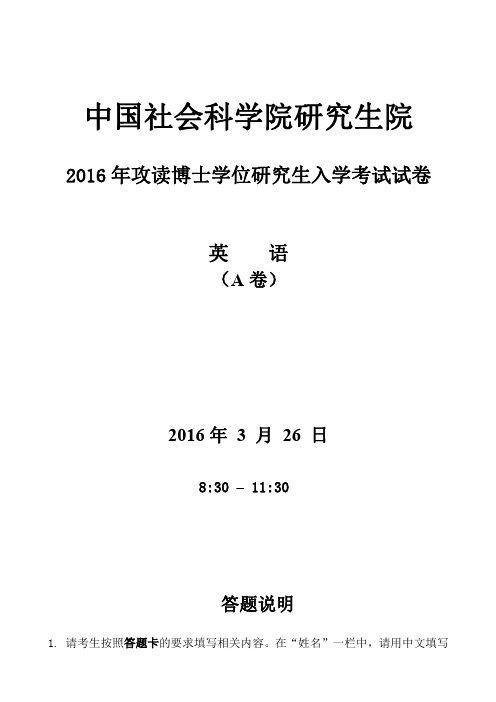
中国社会科学院研究生院2016年攻读博士学位研究生入学考试试卷英语(A卷)2016年3月26日8:30–11:30答题说明1.请考生按照答题卡的要求填写相关内容。
在“姓名”一栏中,请用中文填写本人姓名;“试卷类型”一栏,本人无需填写。
2.在答题卡的“考生编号”一栏中填入本人的准考证号。
例如:考号为012345678900001,请考生在第一行中填写阿拉伯数字012345678900001,然后再将各栏中相应的数字涂黑,如下图所示。
如不涂满,计算机将识别为无效试卷。
3.在答题卡上填写答案时,请务必按照图示将选项格涂满;在A,B,C,D四个选项中,只有一个正确答案。
填写两个或两个以上答案,本题无效。
如需涂改,请务必用橡皮擦净后再重新填写。
4.试卷第三部分(包括阅读7选5、概要)、第四部分(包括英译汉、汉译英),请考生直接写在英语试题答题纸上的指定位置,不再提供额外的答题纸。
请将以下题目的答案填写在答题卡上。
PART I:Cloze(20points)Directions:Choose the best word(s)for each numbered blank.Production workers must be able to do statistical quality control.Production workers must be able to do just-in-time inventories.Managers are increasingly shifting from a"don't think,do what you are told"to a"think,I am not going to tell you what to do"style of management.This shift occurs not because today's managers are more___(1)___than yesterday's managers, but because the evidence is mounting that the second style of management is more___(2)___than the first style of management.But this means that problems of training and motivating the work force both become more central and require different models of behavior.To be on top of this situation,tomorrow's managers will have to have strong background in organizational psychology,human relations,and labor___(3)___.The MIT Sloan School of quickly management attempts to___(4)___our understanding in these areas through research and then quickly bring the___(5)___of this new research to our students so that they can be leading-edge managers when it comes to the human side of the equation.The first three decades after World War II were___(6)___in___(7)___the United States had a huge technological lead___(8)___all the rest in the world.In a very real sense,___(9)___ technological competitive.American firms did not have to worry about their technological competitiveness because they were___(10)___.But that world has disappeared.Today we live in a world where American firms___(11)___ have automatic technological___(12)___.In some areas they are still ahead,in some areas they are ___(13)___,and in some areas they are behind,but on average,they are average.___(14)___this means is that American managers have to understand the forces of technical change in ways___(15)___were not necessary in the past.Conversely,managers from the rest of the world know that it is now possible for them to dominate their American competitors if they understand the forces of technical change better than their American competitors do.In the world of tomorrow managers cannot be technologically___(16)______(17)___their functional tasks within the firm.They don't have to be scientists or engineers inventing new technologies,___(18)___they have to be managers who understand when to bet and when not bet on new technologies.If they___(19)___what is going on and technology effectively becomes a black box,they___(20)___to make the changes.They will be losers,not winners.1.a.enlightened b.enlightening c.enlightenment d.enlighten2.a.sterile b.producing c.productive d.extravagant3.a.economics b.economic c.economy d.economies4.a.take b.arouse c.rise d.advance5.a.results b.evidence c.content d.fruitsual b.flawed c.unusual d.unessential7.a.which b./ c.that d.those8.a.by b.over c.on d.upon9.a.was the world not b.the world was notc.did the world be notd.was not the world10.a.superior b.super c.inferior d.junior11.a.still b.even c.neither d.no longer12.a.superiority b.inferiority c.majority d.minoritymon b.average c.ignorant d.exceptional14.a.How b.That c.What d.Which15.a.that b.they c.those d.who16.a.illiterate b.sophisticated c.literate d.omniscient17.a.regardless b.in spite of c.despite d.regardless of18.a.and b.likewise c.furthermore d.but19.a.didn’t understand b.don't understandc.haven’t understoodd.hadn’t understood20.a.failed b.would have failedc.would faild.would be failedPART II:Reading Comprehension(30points)Directions:Choose the best answers based on the information in the passages below. Passage1The leaders of the mythopoetic men's movement believe that modernization has led to the feminization of men.Mythopoets believe that the rise of the urban industrial society"trapped men into straitjackets of rationality,thus blunting the powerful emotional communion and collective spiritual transcendence that they believe men in tribal societies typically enjoyed".Most importantly,the movement seeks to restore the"deep masculine"to men who have lost it in their more modern lifestyles.Other causes for the loss of the"deep masculine"include:Men no longer being comrades who celebrated their masculinity together.Rather,they had become competitors within their workplaces;Men spending more time in their houses with women than they did with men(in non-competitive terms outside of work).Excessive interaction with women generally kept men from realizing their internal masculinity;Feminism is bringing attention to the“feminine voice.”Through this,the mythopoetic men felt that their voices had been muted(though Bly and others are careful in not blaming feminism for this);The separation of men from their fathers kept them from being truly initiated into manhood,and was a source of emotional damage.Men were suffering further emotional damage due to feminist accusations about sexism.Men should celebrate their differences from women,rather than feeling guilty about them.Men is being discouraged from expressing their emotions.Male inexpressivity is an epidemic and does not correspond to their "deep masculine"natures.Groups of primarily white,middle-aged,heterosexual men from the professional class retreated from their female loved ones in order to join in spiritual rituals that emphasized homosociality,with the central goal of reclaiming the parts of their masculinity that they had lost called the"deep masculine."Because most men no longer perform masculine rituals, mythopoets assert that men have mutated into destructive,hypermasculine chauvinists,or,in the opposite direction,have become too feminized.The mythopoetic men performed rituals at these gatherings,which were meant to imitate those performed by tribal societies when men initiated boys into a deeply essential natural manhood.The movement emphasized the importance of including multiple generations of men in the rituals,so that the men could learn about masculinity from those who were older and wiser.Characteristic of the early mythopoetic movement was a tendency to retell myths,legends and folktales,and engage in their exegesis as a tool for personal ing frequent references to archetypes as drawn from Jungiananalytical psychology,themovement focused on issues of gender role,gender identity and wellness for the modern man(and woman).Advocates would often engage in storytelling with music,these acts being seen as a modern extension to a form of"new ageshamanism"popularized by Michael Harner at approximately the same time.The movement sought to empower men by means of equating archetypal characters with their own emotions and abilities.For instance,Michael Messner describes the concept of"Zeus energy"as emphasizing"male authority accepted for the good of the community".Beliefs about the emotional system based in archetypes of great men,mythopoets sought to channel these characters in themselves,so that they could unleash their"animal-males". This group primarily analyzed the archetypes of King,Warrior,Magician,Lover and Wildman.As a self-help movement the mythopoetic movement tends not to take explicit stances on political issues such as feminism,gay rights or family law(such as the issues of divorce,domestic violence or child custody),preferring instead to stay focused on emotional and psychological well-being.Because of this neutrality,the movement became a site of social criticism by feminists, and was often characterized as anti-intellectual as well as apolitical.Michael Messner once gave a speech at a gathering,in which he addressed the dangers of celebrating the warrior,as instances of rape are higher in countries that glorify war.The mythopoets responded that they were not interested in intellectual or political pursuits,but were primarily concerned with conducting spiritual and emotional work.Additional feminist critique revolved around the movement's absence of women's perspectives,as well as the essentialism in the movement's teachings. Comprehension Questions:21.The mythopoetic men's movement can best be understood as________________.a.a men’s literary movementb.a men's liberation movementc.a men's rights movementd.a second-wave feminist movement22.The mythopoetic men's movement consists of groups of men who retreated from their femaleloved ones in order to strive for________________.a.gay rightsb.same-sex marriagec.masculinityd.myths,legends and folktales23.The idea that modernization has led to the feminization of men means that_________________.a.men cannot be themselvesb.men can no longer make friendsc.men’s voices have changedd.men cannot express themselves24.The root issue is________________.a.feminismb.masculinityc.sexd.gender25.According to the text,the causes for rape must be sought in_________________.a.the celebration of the archetype of the warriorb.the unleashing of men’s"animal-males”c.domestic violenced.the loss of masculine ritualsPassage2Although in the novel the millennium has been and gone,there are no references at all to real contemporary American or global political events of the time of writing.Chapstick,Pledge,and Skevener in their study The Endless Loop of History:Space Time in the work of David Foster Wallace(London2001)have already noted the way Infinite Jest divorces itself from history by the use of sci fi elements.They note how compared with the American post moderns,whose works interact with real historical time,Infinite Jest takes place in an ahistorical,allegorical time.DFW’s invention of Subsidized Time,and the renaming of years after products and companies shows the way in which the soul-rotting effects of advertising infect time as well as internal and external space(cf:Phillip K Dick’s adverts projected onto the moon in The Man in the High Castle). Otherwise,the ubiquitous presence of advertising in contemporary daily life is absent from the novel.Actually,this is not correct.The theme of waste management(also the underlying structure of Don DeLillo’s novel Underworld)reflects some of the anxieties of the90s,the decade in which the novel was written:namely,global warming,environmental concerns,nuclear waste management,including its export to third world countries,the trading of carbon emission points, futures swaps in carbon footprints etc.DFW is here simply satirizing contemporary concerns;and a Freudian reading of this theme is both unnecessary and not really illuminating,Don Gately’s work as a shit hoser notwithstanding.DFW’s use of spurious knowledge and scholarship(including a spurious academic apparatus at the back of the book)has been amply commented on,especially the doubtful physics of J.O.Incandenza’s work with lenses and nuclear annulation,and the iffey math involved in the Eschaton game.By his use of the spurious DFW is not only satirizing the discourse of academic knowledge,but making a serious point about the extent and typology of knowledge itself.Once knowledge becomes so specialized as to become comprehensible to only a very few –those firmly inside the discourse-what status does that knowledge gain?To those outside the discourse,the knowledge can only be taken on trust,and therefore all manner of hoods may be winked.In this case the boundaries between the fictional and the real become blurred,a matter for argument.We are used to questioning the reliability of the narrative voice in fiction,but not so able to question in the same way the reliability of academic discourse or specialist knowledge.The presence of the spurious next to the real infects the real,inviting us to extend our distrust of fictional narrative to non-fictional exposition,the fiction(le mensonge)and the truth become mirrors of each other.The title of a work stands in metonymic relationship to the content of the work:War and Peace,for example,signifies the two main themes and structuring devices of that novel.For existing books,(real,read books),the title summons up everything we know or remember about the book.Where that work is non-existent(fictional,spurious,lost or simply unknown/unread)the title acts as an empty signifier,which we can fill with our imagination, effectively writing the work ourselves in a flash.Barthes calls these bookless titles prolepses; Nabokov creates summaries and detailed commentaries for them(in Pale Fire and The Real life of Sebastian Knight);Borges bases his whole stylistics on this process of metonymic expansion;and Eco fills entire imaginary libraries with these fantastical books.DFW for his imaginary works,like Hoffmann,has a penchant for excessively long and humorous titles,whose length guides us in this process of creation cf:Good Looking Men in Small Clever Rooms that Utilize Every Centimeter of Available Space With Mind-Boggling Efficiency(title of one of J.O.Incandenza’s entertainments), and Mousetraps and their Influence on the Character and Achievement of the Feline Race(title of one of Murr’s books from Hoffmann’s The Life and Opinions of the Tomcat Murr).Comprehension Questions:26.According to the author,the use of some of the anxieties of the90s does not contradict theproposition that the novel Infinite Jest takes place in an ahistorical time because _______________.a.the millennium has been and goneb.DFW is here simply satirizing contemporary concernsc.DFW’s invention of Subsidized Timed.he uses sci fi elements27.DFW’s invention of Subsidized Time exemplifies_______________.a.the ubiquitous presence of advertising in contemporary daily lifeb.the commercialization of American societyc.the endless loop of historyd.American post modernism28.Following Roland Barthes,which of the following titles would be an example of prolepsis?a.War and Peace.b.The Real life of Sebastian Knightc.Mousetraps and their Influence on the Character and Achievement of the Feline Race.d.The Life and Opinions of the Tomcat Murr29.An innovation by DFW to post modern fiction is exemplified by________________.a.the unreliable narratorb.the distrust of academic discoursec.the process of metonymic expansiond.fictional,spurious,lost or simply unknown/unread works30.The title of the novel suggests that it is________________.a.an allegoryb.a parodyc.an apophasisd.a procatalepsis Passage3According to the Koran,it was on a Tuesday that Allah created st September11, when suicide pilots were crashing commercial airliners into crowded American buildings,I did not have to look to the calendar to see what day it was:Dark Tuesday was casting its long shadow across Manhattan and along the Potomac River.I was also not surprised that despite the seven or so trillion dollars that we have spent since1950on what is euphemistically called“defense,”there would have been no advance warning from the FBI or CIA or Defense Intelligence Agency.While the Bushites have been eagerly preparing for the last war but two—missiles from North Korea,clearly marked with flags,would rain down on Portland,Oregon,only to be intercepted by our missile-shield balloons—the foxy Osama bin Laden knew that all he needed for his holy war on the infidel were fliers willing to kill themselves along with those random passengers who happened to be aboard hijacked airliners.For several decades there has been an unrelenting demonization of the Muslim world in theAmerican media.Since I am a loyal American,I am not supposed to tell you why this has taken place,but then it is not usual for us to examine why anything happens;we simply accuse others of motiveless malignity.“We are good,”G.W.proclaims,“They are evil,”which wraps that one up in a neat ter,Bush himself put,as it were,the bow on the package in an address to a joint session of Congress where he shared with them—as well as with the rest of us some-where over the Beltway—his profound knowledge of Islam’s wiles and ways:“They hate what they see right here in this Chamber.”I suspect a million Americans nodded sadly in front of their TV sets.“Their leaders are self-appointed.They hate our freedoms,our freedom of religion,our freedom of speech, our freedom to vote and assemble and disagree with each other.”At this plangent moment what American’s gorge did not rise like a Florida chad to the bait?A member of the Pentagon Junta,Rumsfeld,a skilled stand-up comic,daily made fun of a large group of“journalists”on prime-time TV.At great,and often amusing,length,Rummy tells us nothing about our losses and their losses.He did seem to believe that the sentimental Osama was holed up in a cave on the Pakistan border instead of settled in a palace in Indonesia or Malaysia, two densely populated countries where he is admired and we are not.In any case,never before in our long history of undeclared unconstitutional wars have we,the American people,been treated with such impish disdain—so many irrelevant spear carriers to be highly taxed(those of us who are not rich)and occasionally invited to participate in the odd rigged poll.The Bush administration,though eerily inept in all but its principal task,which is to exempt the rich from taxes,has casually torn up most of the treaties to which civilized nations subscribe—like the Kyoto Accords or the nuclear missile agreement with Russia.The Bushites go about their relentless plundering of the Treasury and now,thanks to Osama,Social Security(a supposedly untouchable trust fund),which,like Lucky Strike green,has gone to a war currently costing us$3 billion a month.They have also allowed the FBI and CIA either to run amok or not budge at all, leaving us,the very first“indispensable”and—at popular request—last global empire,rather like the Wizard of Oz doing his odd pretend-magic tricks while hoping not to be found out.Meanwhile, G.W.booms,“Either you are with us or you are with the Terrorists.”That’s known as asking for it. Comprehension Questions:31.The author believes that America’s defense spending______________.a.protects the national securityb.is good for humanityc.primarily fights terrord.is a misnomer32.The author uses the term“rigged pole”to______________.a.cast doubt upon the voting processb.refer to public opinion pollsc.remind the reader of political corruptiond.add humor to an otherwise serious article33.In the essay,President George W Bush’s use of dichotomy is portrayed as______________.a.jingoistic and rationalb.misleading and simplisticc.well-considered and politically expedientd.effective rhetoric that will stand the test of time34.The use of the term“Pentagon junta”indicates the author’s belief that______________.a.the Pentagon has transformed into a populist political machineb.the leaders of America’s military establishment were overrepresented in Bush’s White Housed.journalists have not been able to get solid information from the Bush administration35.When the author mentions the Tresury,Social Security,the FBI,and the CIA,he intends tohighlight the fact that______________.a.war-related expenses are like magic tricksb.America is spending harmful amounts of money on“security”c.it is difficult to fund the American empired.America’s empire is not popular,but it may be necessary to maintain“security”Passage4The ground broken by Freud and Breuer’s pronouncement,in the“Preliminary Communication”concerning the psychogenesis of hysteria,that“hysterics suffer mainly from reminiscences”brought to view the tangled roots linking the developing concept of a hidden and powerful unconscious with nineteenth century anxieties concerning memory’s absence and excess. Freud’s later emphasis upon fantasy,rather than memory,in his revised writings on hysteria’s aetiology can be regarded,in part,as the vanquishing of memory’s unbiddability by fantasy’s origins in unconscious wishes and anxieties.Two qualifying currents ran through this new emphasis upon fantasy and desire rather than upon involuntary memory.First,the issue of personal responsibility raised by this new emphasis on unconscious sexual and violent fantasies was mitigated by Freud’s consolation to his earliest hysterical patients that“we are not responsible for our feelings”.Second,the possible association only of fantasy with the determining force of unconscious inner processes.Hystories,which continues its author’s earlier study of hysteria associates this return with the development of a divisive“survivor”culture characterized by blame and vengeful litigation. Showalter’s fundamentally Enlightenment critique of this culture suggests that only a renewed emphasis upon fantasy can rescue contemporary western culture from the distortions that threaten its stability and limit its capacity for healthy and democratically organized public life.In short, Showalter calls for the nurturing of a psychically enlightened culture within which collective or individual responsibility can be acknowledged for violent,fearful,or sexual fantasies.The thesis propounded in this polemical and accessible work is that hysteria,despite the views of the psychological establishment,is“alive and well”in the late twentieth century western world, though in transformed guise.Hysteria’s domain has shifted,argues Showalter,from the clinic to the popular narrative,or“history”,in which various arguably“traumatic experiences”take centre-stage. TV,the popular press,and e-mail spread hystories with which growing numbers of troubled individuals are coming to identify.These hystories of ME,Gulf War Syndrome,recovered memory, multiple personality disorder,satanic abuse and alien abduction each provide explanatory narratives that allow somatic or psychical symptoms.The sub-title of the US version of Hystories and aspects of its argument foreground the part played by the speed and spread of contemporary electronic communications in the escalation of hystories.However,Hystories’argument,in keeping perhaps with the book’s critique of hystories themselves,eschews direct accusation.Nevertheless,the sharpest edge of Showalter’s cultural critique of hystories is directed against their crossing of the line from private narratives that enable therapeutic sense to be made of a life,to media-spurred,public,political and judicial“rituals of testimony”that involve accusation and persecution.In a final chapter that warns—a littlehysterically perhaps—of the coming hysterical plague,Showalter likens the emergence and proliferation of these public discourses to the witch-hunts of the seventeenth century.She concludes that this development,demonstrates the“human propensity to paranoia”.At base,Hystories calls for a return to those insights and values arguably delivered by Freud’s turn towards fantasy.For Showalter,hystories appear to represent a withdrawal from the hard task enjoined by those insights:that of grasping as our own unconscious fantasies the violent, destructive,or sexual forces that hystories locate and persecute elsewhere and in others. Showalter’s impassioned plea is to return to enlightenment values.“The hysterical epidemics of the 1990s continue to do damage”,she concludes“in distracting us from the real problems and crises of modern society,in undermining respect for evidence and truth,and in helping support an atmosphere of conspiracy and suspicion.They prevent us from claiming our full humanity as free and responsible beings”.It is the recognition of universal human propensities and,in particular,the grasping of responsibility for our own projections that promises to move us beyond a culture of blame inhabited by perpetrators and victims,and towards a freer and a more equal society. Comprehension Questions:36.Showalter’s interest in to be found mainly in the academic discipline of________________.a.historyb.sociologyc.psychologyd.the media37.According to Showalter,soldiers suffering from psychosomatic ailments known as the‘GulfWar Syndrome’are dealing with________________.a.repressed memories from the First Iraq War(1991)b.delusions created by chemical or biological weaponsc.unconscious fears about contact with toxinsd.somatic expression of exposure to depleted uranium38.The attitude of the reviewer of the book by Showalter may best be described as_________________.a.reservedb.ironicc.sympatheticd.convinced39.According to the researcher,mankind has always had the tendency of________________.a.externalization of the causes of unhappinessb.reduction of complexities to simplified storiesc.deification of supernatural phenomenad.schizophrenic paranoia40.The analysis and comparison with seventeenth-century witch-hunts by Showalter,successfullypredicts the hysteria and persecution in our day of_________________.a.paedophilesb.catholicsc.veganistsd.terrorists请将以下题目的答案填写在答题纸上。
2016年社科院产企业管理专业考博真题考博英语-育明考研考博

中国社会科学研究院企业管理专业考博英语真题报考分析--育明考博一、中国社会科学研究院企业管理专业考博考试内容分析(育明考博辅导中心)专业招生人数初试内容复试内容120202企业管理2016年4人①1001英语或1002日语或1003俄语②2002管理学原理③3181企业管理学①外国语综合能力测试50分(含口语及听力)②专业综合150分(笔试、面试)育明考博辅导中心张老师解析:1、中国社会科学研究院企业管理专业考博的报录比平均在5:1左右(竞争较激烈)2、本专业有7个研究方向:01企业成长与战略管理(黄群慧)02公司控制与企业并购(黄速建)03公司战略与组织创新(李海舰)05网络组织与战略管理(罗仲伟)06企业制度与组织治理(余菁)07创新管理与组织变革(王钦)3、初试英语拉开的分差较小,两门专业课拉开的分差非常大,要进入复试就必须在两门专业课中取得较高的分数,专业课的复习备考中“信息”和“方向”比单纯的时间投入和努力程度更重要。
4、以同等学力资格报考的考生初试时需加试“政治理论”(考试范围:马克思主义经典选读、中国特色社会主义理论),复试时需加试两门本专业硕士学位主干课程(笔试)。
5、凡报考工业经济系各专业的考生,同等学力、MBA、在职申请获得硕士学位者、跨专业考生以及境外培养考生均需加试《经济学综合知识》(含高等数学)。
6、入学考试总成绩=初试成绩*60%+复试成绩*40%。
育明教育考博分校针对中国社会科学研究院企业管理专业考博开设的辅导课程有:考博英语课程班·专业课课程班·视频班·复试保过班·高端协议班。
每年专业课课程班的平均通过率都在80%以上。
根植育明学校从2006年开始积累的深厚高校资源,整合利用历届育明优秀学员的成功经验与高分资料,为每一位学员构建考博成功的基础保障。
(中国社会科学研究院工业经济系考博资料获取、课程咨询育明张老师叩叩:772678537)二、中国社会科学研究院工业经济系历年考博复试分数线(育明考博课程中心)年份复试分数线进入复试人数/录取人数(不含硕博连读)2013年英语A类46分B类51小语种60分专业课60分21人/14人2014年英语A类46分B类51小语种60分专业课60分20人/14人2015年英语A类46分B类51小语种60分专业课60分18人/14人育明考博辅导中心张老师解析:1、中国社会科学研究院工业经济系共有4个博士招生专业:020202区域经济学020205产业经济学120201会计学120202企业管理,各个专业竞争压力还是比较大的。
华慧浙江大学考博英语词汇命题特点
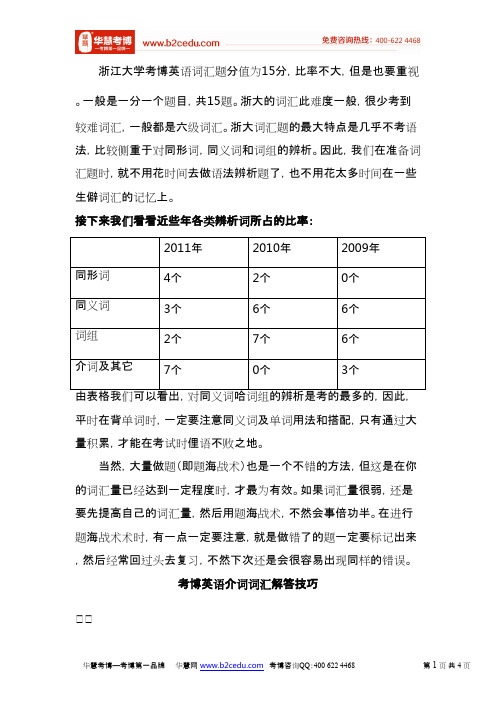
浙江大学考博英语词汇题分值为15分,比率不大,但是也要重视。
一般是一分一个题目,共15题。
浙大的词汇此难度一般,很少考到较难词汇,一般都是六级词汇。
浙大词汇题的最大特点是几乎不考语法,比较侧重于对同形词,同义词和词组的辨析。
因此,我们在准备词汇题时,就不用花时间去做语法辨析题了,也不用花太多时间在一些生僻词汇的记忆上。
接下来我们看看近些年各类辨析词所占的比率:2011年2010年2009年同形词4个2个0个同义词3个6个6个词组2个7个6个介词及其它7个0个3个由表格我们可以看出,对同义词哈词组的辨析是考的最多的,因此,平时在背单词时,一定要注意同义词及单词用法和搭配,只有通过大量积累,才能在考试时俚语不败之地。
当然,大量做题(即题海战术)也是一个不错的方法,但这是在你的词汇量已经达到一定程度时,才最为有效。
如果词汇量很弱,还是要先提高自己的词汇量,然后用题海战术,不然会事倍功半。
在进行题海战术术时,有一点一定要注意,就是做错了的题一定要标记出来,然后经常回过头去复习,不然下次还是会很容易出现同样的错误。
考博英语介词词汇解答技巧介词是英语中最活跃的词类之一。
一些常用介词的搭配能力非常强,可用来表示各种不同的意思,大部分的习惯用语都是由介词和其他词构成的,所以介词出现在英语测试的各个项目中。
对介词的测试点主要包括:1)一些主要介词的基本意思的掌握程度;2)介词与其他词特别是动词、形容词和名词的搭配的掌握程度。
所以在准备介词词汇时,考生应该注意以下几点:1.介词在句子中不能独立充当一个成分,而是需要和一个名词或相当于名词的结构一起构成介词短语,从而在句子中充当一个成分。
能和介词一起构成介词短语的有: 1)名词。
如: The car crashed in to the train,and two men in it were killed on the spot. 2)代词。
如: “What does your car look like?”“That is similar in shape with yours.” 3)动名词。
- 1、下载文档前请自行甄别文档内容的完整性,平台不提供额外的编辑、内容补充、找答案等附加服务。
- 2、"仅部分预览"的文档,不可在线预览部分如存在完整性等问题,可反馈申请退款(可完整预览的文档不适用该条件!)。
- 3、如文档侵犯您的权益,请联系客服反馈,我们会尽快为您处理(人工客服工作时间:9:00-18:30)。
华慧考博针对2016年社科院考博英语试题特点分析
来源:华慧考博网
综述:2016年社科院考博英语试题(A卷)试题分为有选项的完型填空、阅读理解题、阅读和写作(A部分为从所给的7个句子中选5个句子分别填入文章中,B部分为用英语对文章内容进行概括)、翻译(A部分为英文文章中5个划线句子的英译中;B部分为三个小段落的中译英)四个部分。
除阅读理解部分比较难外,其它部分的试题属于中等难度。
有选项的完型填空主要考察词义辨析、逻辑关系、固定搭配和语法题,考生在做这部分题时一定要利用上下文语境来做题。
阅读部分有四篇文章,文章内容涉及男子气概在现代社会中的失去、科幻小说、美国的国防开支、小说家肖沃尔特和她所写的书Hystories。
阅读和写作部分难度不大,对于其中的句子选择,可以从利用上下文对照来做;而对于文字内容的概括,这需要考生通读全文后来总结。
翻译部分的英译中或中译英的难度属于中等,其不仅要求考生掌握一定的语法知识和词汇量,还要熟练地运用中英互译的技巧和方法。
(华慧考博
)
一、社科院考博英语:有选项的完型填空
1. 分值+题量:20分= 20道题
2. 难度:大学英语六级水平
3. 考点:主要考察词义辨析、逻辑关系、固定搭配和语法题,考生在做这部分题时一
定要利用上下文语境来做题
二、社科院考博英语:阅读题
1. 分值+题量:30分=4篇(每篇5道题,共20道题)
2. 难度:高于英语专业四级水平(641-671字)
3. 题型:阅读文章后做选择题
4. 特点:文章内容涉及男子气概在现代社会中的失去、科幻小说、美国的国防开支、
小说家肖沃尔特和她所写的书Hystories。
试题整体难度较大,文章内容不好理解。
5. 考点:侧重于推理判断题和细节事实题
三、社科院考博英语:阅读和写作
A部分
1. 分值+题量:10分=每个句子5分
2. 难度:大学英语六级水平
3. 题型:从所给的7个句子中选5个句子分别填入文章中
4. 考点:充分利用上下文语境来进行推理的能力。
B部分
1. 分值+题量:10分
2. 难度:大学英语六级水平
3. 题型:用英语对文章内容进行概括
4. 考点:考察考生通读全文后用英语对文章内容进行概括的能力。
三、社科院考博英语:翻译
A部分
1. 分值+题量:15分=一篇英文文章中5个划线句子的英译中
2. 难度:大学英语六级水平
3. 题型:英译汉
4. 考点:考察对分词短语充当伴随状语、不定式短语充当目的状语、that引导从句充
当后置定语、被动语态,it is…that引导的强调句等的翻译能力
B部分
1. 分值+题量:15分=三个小段落的中译英
2. 难度:大学英语六级水平
3. 题型:中译英
4. 考点:考察对which引导从句充当后置定语、介词of短语充当后置定语、分词短语
充当伴随状语、that引导从句充当后置定语、分词短语充当后置定语等的翻译能力
以上内容为华慧考博网独家分析整理,如有转载请说明来源。
